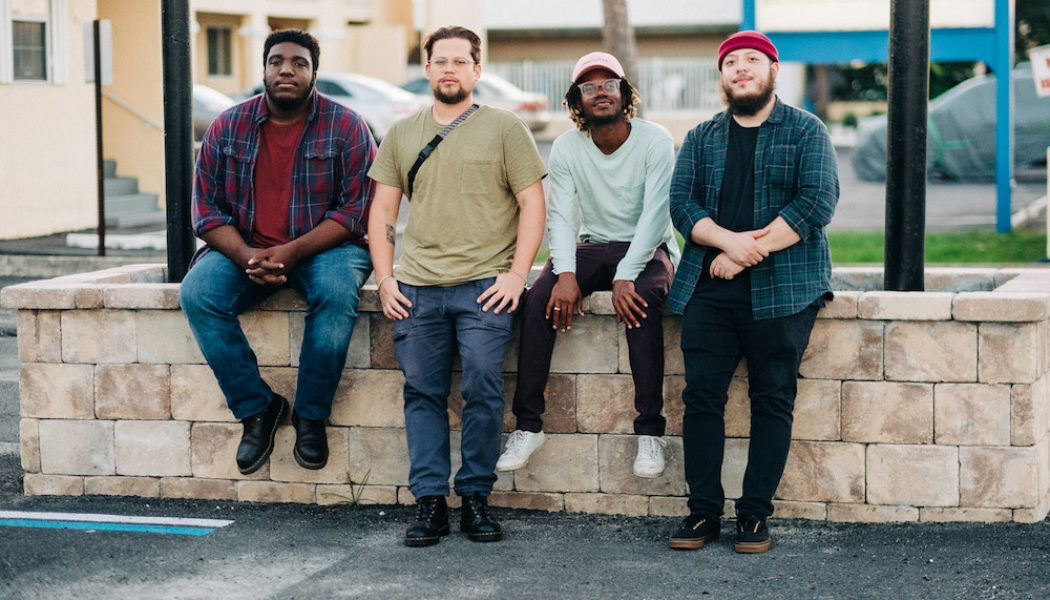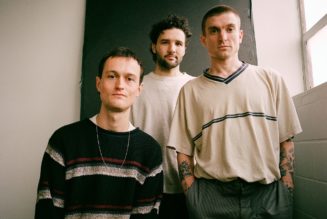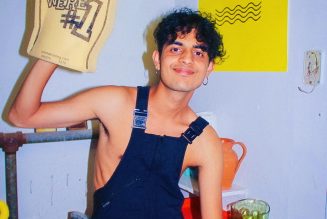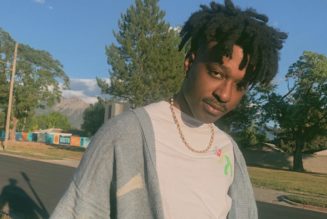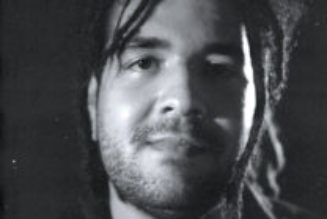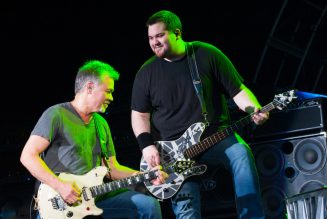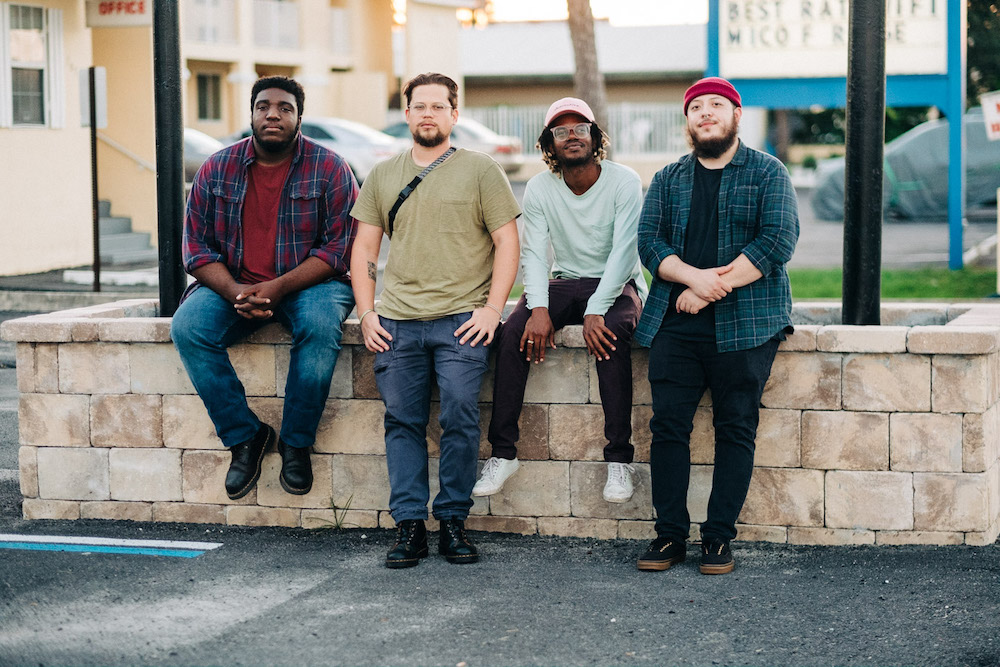
Before the serendipitous meeting that spawned a record deal, Seafoam Walls’ Jayan Bertrand was going through a “particularly rough patch” — one that any musician might have interpreted as a cosmic middle finger.
“I was looking for a job, and on the way to one of the interviews I’d gotten called back for, I got into an accident and totaled my car that I’d only had a few weeks,” the singer-guitarist tells SPIN. “I walked away mostly unscathed — it was just a little pain in my thigh and my wrist. But on top of that, I was still in my job search. And III Points was in a few weeks.”
The festival, one of Miami’s largest, felt like a potential turning point for the self-described “Caribbean jazzgaze” band. But entering that situation with a cloud hovering over them “didn’t feel good.”
“[At a previous year of the festival], we’d gotten these little gift baskets — this was around the time where I’d gone to Haiti,” Bertrand, who has family in the country, says. “When I left, I threw away all the things I used to smoke weed with — I just tossed it all in the garbage. I said, ‘I’m kinda done with this stuff.’ I came back from Haiti with no urge to smoke, and then [the accident] happened and I was all depressed again. It was right there in the gift basket, and I was like, ‘Fuck it.’ When BADBADNOTGOOD is playing right in front of you? You know, the recipe for disaster was all there.”
When Seafoam Walls finally got onstage, Bertrand’s guitar suddenly cut out after soundcheck — as he told Voyage MIA, he “nearly bombed in front of a huge audience.”
On top of the personal struggles and musical malfunctions, Bertrand had cycled through a handful of members since launching the project in 2014. The universe seemed to be sending a message. But his fate changed after a chance meeting with Eva Prinz, co-operator of the Ecstatic Peace Library — including record label The Daydream Library Series — with Sonic Youth’s Thurston Moore.
“I was at this jazz night at this place called The Center for Subtropical Affairs — a really cool venue, open-air space,” he says. “I was having this argument with one of my friends, and it was getting really intense. [Prinz] was already chatting it up with my friend earlier. She saw that I was upset and was trying to calm me down. Eventually, my friend was like, ‘Why don’t you tell her about your music?’ — kind of to distract me a bit. I finally got around to telling them about the band and gave her a link. They listened to it on the drive back home.
“I remember catching a glimpse of her phone, and I saw Thurston’s name in it,” he continues. “I was like, ‘What? You talk to this dude?’ not knowing this is her fiancé. I get a message back from them, saying that they wanted me to come meet at a record signing he was doing at a local record shop. From there, we talked about possibly putting out a record. At first, the idea was to do a single, but they found out we had a record already done, so they were like, ‘Why don’t we just do that?’”
That meeting leads us to the self-produced XVI, a thrilling sonic collision of Afro-Caribbean groove, shoegaze warble, and jazz harmony. The band’s current lineup — Bertrand, guitarist Dion Kerr, bassist Josh Ewers, and electronic drummer Josue Vargas — spoke to SPIN about their unique style and the bumpy road to their debut LP.
[embedded content][embedded content]
SPIN: Jayan, I understand your taste growing up was all over the map.
Jayan Bertrand: When I was a kid, I would listen to whatever was on the radio. In the ‘90s, that was mostly pop — Backstreet Boys, ’N Sync, Britney Spears. Then you had techno: I know “Sandstorm” was a pretty famous one. And then there was, like, Linkin Park — just a lot of the popular stuff from every genre. Every [radio] station had their genre that they focused on. But by the time I got to middle school and high school, the popular genres were changing. The rock stuff that I was finding later on was a lot of underground and indie stuff, which I had to get introduced to by, ya know, girls I was interested in during high school. [Laughs.] That was kind of my introduction to indie-rock.
What about you, Dion? Who’s bringing in this jazz influence?
Dion Kerr: My influences are also all over the place, but that’s why I like this band because everyone brings so much to the table. I have two musicians in my family. My dad played a lot of folk musician, so I was around a lot of fingerpicking guitars and lush harmonies. My older brother is an amazing drummer and multi-instrumentalist, and he turned me on to a lot of different stuff. I was also into the visual arts, and I got into art music and ambient music. And I was a big jazz-head at one point too, got into Charles Mingus. I try to always expand my horizons.
Josh Ewers: I played mainly upright [bass] in school — mainly classical, orchestra music. Then I started playing jazz in high school. After that I was working on weekends — I’d go out and gig and start going to jam sessions. I heard about Dion just from playing in Miami, going to jams and such, trying to find other bass players in town is like a hunt. You have to really dig in the cracks. No two bass players are in the same place at the same time. But they came to West Palm [Beach] to Bumble Fest, and I was like, “These guys are so cool.”
Josue Vargas: For me, it was mostly on the hip-hop blend of jazz. I love MF Doom and Robert Glasper and all that stuff. Trying to bring that into this environment in a live setting has been a lot of fun. That’s really my meld into the situation: that hip-hop vibe behind all these other cultural influences in the band.
That naturally brings us to this genre tag that you guys seemingly invented: “Caribbean jazzgaze.” Is that something one of you envisioned, like, “This is a combo of all these sounds I’m hearing?” Did that concept only emerge after playing together?
Bertrand: I’d say the Caribbean aspect has a lot to do with my background. Josh is half-Bahamian, so there’s a little bit of that in what we do. And living in Miami, a place with a lot of cultures that aren’t your own, and being exposed to all of that — especially the Latin sound, which is so prevalent in Miami, aside from the Haitian culture and the Jamaican culture. It’s like mixing those rhythms with some of the garage rock I was being exposed to in the underground music scene. And then meeting Josue and Dion from the jazz scene. Because I was learning jazz guitar and was so drawn to the sound already, it was natural for me to find the clubs they were playing in.
[embedded content][embedded content]
I feel like we’re into this jazz renaissance where a lot of younger bands are tapping into it and combining it with electronica and hip-hop and funk.
Bertrand: I think that’s partly because everything feels so established and tried-and-true — if you’re making an effort to sound different, you’re going to have to pull from a lot of different places — or just make a fool of yourself and be that one pioneer and take all the jokes until it catches on. And even when it doesn’t, someone will find it later on and get inspired by it. It’s like Lil B: Everyone eventually became a by-product of Lil B, even if they didn’t really want to. But the people that they liked liked Lil B. That’s kind of why I get surprised sometimes when people like our stuff — because people have to say “I don’t know what this is” or “I can’t put my finger on it,” it tells me I’m doing something different. It can either work or not, and I’m just glad [it is] so far.
The tempo and groove changes on this album are pretty crazy, like on “You Always Said.” Are you guys into progressive rock?
Bertrand: You’re right about that prog-rock sound — that’s a genre I really like. This one band, White Denim — in their early music, the way they wrote songs, it’s like, “This isn’t how a song will normally go.” I love any band that will play with the structure of songs, especially in math-rock — the way they play with time signatures and the meter. The same thing in jazz. The challenge of having to find the [one beat] is fun. I like to throw that in my music.
Before you met Thurston, were you fans of his music? Were you nervous to meet him?
Bertrand: I remember when I was learning guitar and trying to write my own music, I came across that song “Incinerate” by Sonic Youth. It was one of my all-time favorites. Every time I was delving into shoegaze and exploring that sound, Sonic Youth’s name always popped up. I was like, “Alright, I gotta see what they added to this whole era of sound.” The things they did with noise, they were definitely influential on older projects I was involved in. I don’t use it so much now, but it was good to experiment with, and it added to my repertoire.
Kerr: [Meeting Thurston] was kinda meant to be. We’d been working on the album for a whole year before that and actually turned down a couple record deals from smaller, more DIY labels. By the time this came along, it felt like, “This is what should happen now.”
Some of this material previously came out on your previous EP, 2018’s R-E-F-L-E-C-T, but it sounds like you guys did a lot of rearranging.
Bertrand: We had another member before, our drummer, and I had to kick him out of the band. It was just rough because he was on a lot of old recordings, and he was kind of a staple in the project, even though I started it. It was just kind of, in a way, to remove that energy from the music, but also to bring a new energy to those songs. It just needed to feel fresh again, and that’s why some parts got rearranged — and the addition of the electronic drums. It all needed to feel fun to play again.
[embedded content][embedded content]
You guys have a great sense of dynamics. I love “Rushed Rain” — the build-in intensity at the end where it all crescendoes with the guitars and keys.
Bertrand: I wrote that one as kind of an homage to my mom. I originally recorded it over a thunderstorm, so you can hear that playing throughout the song. I drew a connection to Hurricane Andrew — I don’t know if it started or ended a month before my birth, but my mom was in Miami when it was happening. They were telling her to go to the hospital, just so she wasn’t in any danger when the hurricane was happening, but she decided to stay home. Even though there aren’t any words in the song, the whole idea revolves around her and her surviving that storm — and me ultimately being able to provide some music because of it.
